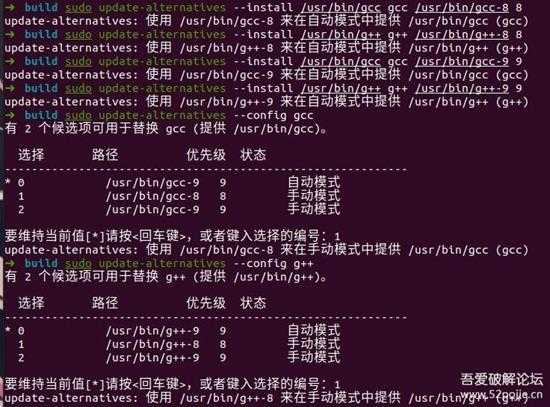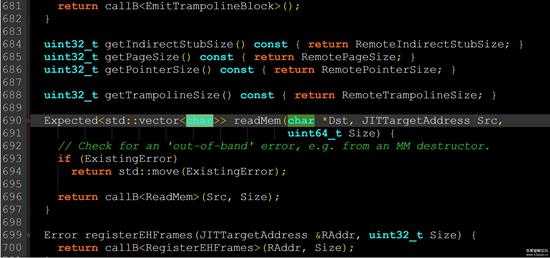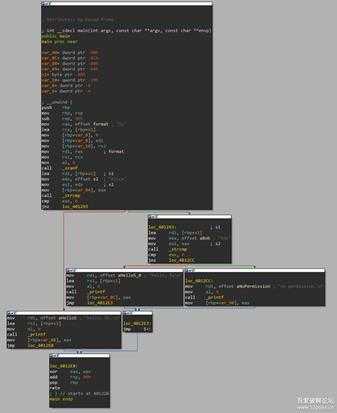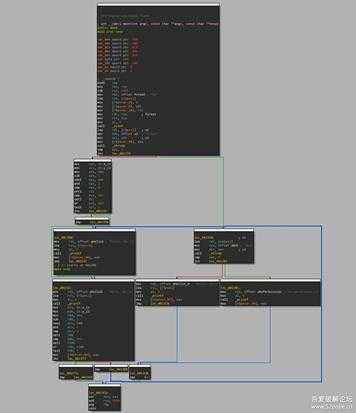引言
虚假控制流(Bogus Control Flow,BCF),通过加入包含不透明谓词的条件跳转(也就是跳转与否在运行之前就已经确定的跳转,但IDA无法分析)和不可达的基本块,来干扰IDA的控制流分析和F5反汇编。
依赖
- IDA7.7
- 虚拟机Ubuntu20.04
Ubuntu20.04安装ollvm+各种踩坑记录
根据参考链接1,主要的命令就这些:
# 截至2022.09.25,这玩意已经5年没更新了……git clone -b llvm-4.0 https://github.com/obfuscator-llvm/obfuscator.git# 这里build文件夹和obfuscator-llvm-4.0文件夹同级mkdir build-llvm-4.0 && sudo chmod 777 -R build-llvm-4.0 && cd build-llvm-4.0cmake -DCMAKE_BUILD_TYPE=Release ../obfuscator-llvm-4.0/# 防止出现Permission Deniedsudo make -j5但你先别急,这里水很深,不看完参考链接1以及我总结的踩坑记录的话,泥巴握不住!
作者:hans774882968以及hans774882968以及hans774882968
本文52pojie:https://www.52pojie.cn/thread-1692596-1-1.html
本文juejin:https://juejin.cn/post/7147302252846252046/
本文csdn:https://blog.csdn.net/hans774882968/article/details/127043163
1、gcc和g++需要降级
如果用的是9及以后的版本,make时会没有任何提示,忽然报错make: *** [Makefile:152:all] 错误 2。直接执行下面这些命令进行降级就行:
sudo apt install gcc-8 g++-8 -ysudo update-alternatives --install /usr/bin/gcc gcc /usr/bin/gcc-8 8sudo update-alternatives --install /usr/bin/g++ g++ /usr/bin/g++-8 8sudo update-alternatives --install /usr/bin/gcc gcc /usr/bin/gcc-9 9sudo update-alternatives --install /usr/bin/g++ g++ /usr/bin/g++-9 9sudo update-alternatives --config gccsudo update-alternatives --config g++# 最后可以看看版本是否修改成功gcc -vg++ -v效果
1.jpg
2、编译前要先修改源码
根据参考链接1,不修改源码会踩坑。找到<你的ollvm目录>/include/llvm/ExecutionEngine/Orc/OrcRemoteTargetClient.h,按照下图把690行的readMem的返回类型从Expected<vector<char改为Expected<vector<uint8_t(这里参考链接1错误地说成了uint_8了)。
2.jpg
3、注意权限问题
如果你在编译时,看到make失败前有一大堆Permission Denied,说明你权限没给够。
- 建议编译前给到
build-llvm-4.0和obfuscator-llvm-4.0的父文件夹777权限:sudo chmod 777 -R <父文件夹名>,防止新生成的文件Permission Denied。 - 不要在挂载点的文件夹进行编译,否则会有权限错误。
- 建议编译期间每次看到
build-llvm-4.0/bin新生成一个文件,都给它777权限,防止Permission Denied造成失败(其实编译失败也没事,编译好的文件不会重新编译,不是很耽误时间。每次看到新生成的文件出现Permission Denied,先给它权限再重新编译即可)。
4、给足虚拟机内存
不给足内存的话虚拟机会死机。也可以选择降一降作业数,比如sudo make -j7降到sudo make -j5。
编译成功
大概等了一小时,终于成功了!纪念一下!
3-终于make成功了,纪念一下.jpg
先看一个demo
写个bcf_demo.cpp:
#include <bits/stdc++.h>using namespace std;#define rep(i,a,b) for(int i = (a);i <= (b);++i)#define re_(i,a,b) for(int i = (a);i < (b);++i)#define dwn(i,a,b) for(int i = (a);i >= (b);--i)void dbg() { puts ("");}template<typename T, typename... R>void dbg (const T &f, const R &... r) { cout << f << " "; dbg (r...);}template<typename Type>inline void read (Type &xx) { Type f = 1; char ch; xx = 0; for (ch = getchar(); ch < '0' || ch > '9'; ch = getchar() ) if (ch == '-') f = -1; for (; ch >= '0' && ch <= '9'; ch = getchar() ) xx = xx * 10 + ch - '0'; xx *= f;}void read() {}template<typename T, typename ...R>void read (T &x, R &...r) { read (x); read (r...);}int main (int argc, char const *argv[]) { char name[100]; scanf ("%s", name); if (strcmp (name, "Alice") == 0) { printf ("hello, %s.\n", name) ; } else if (strcmp (name, "Bob") == 0) { printf ("hello, %s\n", name); } else { printf ("no permission.\n"); } return 0;}用clang正常编译
'build-llvm-4.0/bin/clang++ 的绝对路径' 'bcf_demo.cpp 的绝对路径' -o bcf_demo_normalIDA反汇编效果:
int __cdecl main(int argc, const char **argv, const char **envp){ char s1[112]; // [rsp+10h] [rbp-80h] BYREF const char **v5; // [rsp+80h] [rbp-10h] int v6; // [rsp+88h] [rbp-8h] int v7; // [rsp+8Ch] [rbp-4h] v7 = 0; v6 = argc; v5 = argv; scanf("%s", s1); if ( !strcmp(s1, (const char *)(unsigned int)"Alice") ) { printf("hello, %s.\n", s1); } else if ( !strcmp(s1, (const char *)(unsigned int)"Bob") ) { printf("hello, %s\n", s1); } else { printf("no permission.\n"); } return 0;}流程图:
4.jpg
加上bcf,编译:
'build-llvm-4.0/bin/clang++ 的绝对路径' -mllvm -bcf 'bcf_demo.cpp 的绝对路径' -o bcf_demoIDA反汇编效果:
int __cdecl main(int argc, const char **argv, const char **envp){ char s1[112]; // [rsp+20h] [rbp-80h] BYREF const char **v5; // [rsp+90h] [rbp-10h] int v6; // [rsp+98h] [rbp-8h] int v7; // [rsp+9Ch] [rbp-4h] v7 = 0; v6 = argc; v5 = argv; scanf("%s", s1); if ( !strcmp(s1, (const char *)(unsigned int)"Alice") ) { if ( y_12 >= 10 && ((((_BYTE)x_11 - 1) * (_BYTE)x_11) & 1) != 0 ) goto LABEL_9; while ( 1 ) { printf("hello, %s.\n", s1); if ( y_12 < 10 || ((((_BYTE)x_11 - 1) * (_BYTE)x_11) & 1) == 0 ) break;LABEL_9: printf("hello, %s.\n", s1); } } else if ( !strcmp(s1, (const char *)(unsigned int)"Bob") ) { printf("hello, %s\n", s1); } else { printf("no permission.\n"); } return 0;}流程图:
5.jpg
对比两图,bcf确实让程序更复杂了。
这些跳转中的x_11和y_12位于.bss段,并且通过交叉引用发现没有被修改过,也就是说x_11和y_12在运行过程中一直为0。这里的x_11和y_12被称为不透明谓词,所谓不透明,就是IDA难以推断其在运行时的值,但我们都知道它就是0。
简单分析一下bcf加入的干扰语句。y_12 >= 10 && ((((_BYTE)x_11 - 1) * (_BYTE)x_11) & 1) != 0:因为相邻两个数的乘积必为偶数,故此式总是false。根据德摩根定律,y_12 < 10 || ((((_BYTE)x_11 - 1) * (_BYTE)x_11) & 1) == 0就总是true。因此printf("hello, %s.\n", s1);恰好只执行一次。那些永远不会执行到的代码块,就叫做不可达的基本块。这些跳转和不可达基本块并不会影响程序原有的逻辑,但会干扰我们的分析,这就是虚假控制流混淆达到的效果。
尝试用IDApython去除bcf
我们把上面的demo写得更复杂一点:
#include <bits/stdc++.h>using namespace std;#define rep(i,a,b) for(int i = (a);i <= (b);++i)#define re_(i,a,b) for(int i = (a);i < (b);++i)#define dwn(i,a,b) for(int i = (a);i >= (b);--i)void dbg() { puts ("");}template<typename T, typename... R>void dbg (const T &f, const R &... r) { cout << f << " "; dbg (r...);}template<typename Type>inline void read (Type &xx) { Type f = 1; char ch; xx = 0; for (ch = getchar(); ch < '0' || ch > '9'; ch = getchar() ) if (ch == '-') f = -1; for (; ch >= '0' && ch <= '9'; ch = getchar() ) xx = xx * 10 + ch - '0'; xx *= f;}void read() {}template<typename T, typename ...R>void read (T &x, R &...r) { read (x); read (r...);}int main (int argc, char const *argv[]) { char name[100]; scanf ("%s", name); if (strcmp (name, "Alice") == 0) { printf ("hello, %s.\n", name) ; } else if (strcmp (name, "Bob") == 0) { printf ("hello, %s\n", name); } else { printf ("no permission.\n") ; return 0; } re_ (i, 0, 10) { if (i & 1) dbg (i << 1); else dbg (i << 1 | 1); } return 0;}




